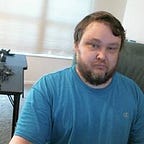Control: Two Vastly Different Novels…
I, Dalton Lewis, fearful writer, faced two weeks of self-isolating at the start of the new year. I look to face many more weeks at this rate — the president is beginning to disappoint me. I had plenty of time because the super duper psycho death virus is raging, infecting 800,000 people a day. They said that Omicron was killing fewer people, but deaths are up fifty percent from two weeks ago, so that theory is gone, too. I, a fat, forty-something year-old man, need to self-isolate or get very sick and maybe die. Therefore — reading and writing. I order food for delivery regularly. I work out most days, chugging away at the exercise bike. We ordered a new space heater because my room’s space heater stopped being as effective. I persist. I live. I decided to read a book a week because it might help me to become a better writer.
The books. The first book I read was called The Fellowship of the Ring. JRR Tolkien wrote one of the most successful fantasy adventure novels of all time. It’s listed as one of the best books of all time, and boy, do I understand why. It’s full of heart, adventure, wonder, character, and all sorts of excitement. That’s why it’s so ironic that it took me years to finish the damned thing — I read the second 200 pages this year and had read the first 200 pages a long time ago. The plot is simple: Frodo Baggins has a ring, and the bad guys want it. Within this simple premise lies the opportunity for a grand adventure.
I liked the relationships between the characters. Frodo and Sam are the quintessential best friends. Sam won’t let Frodo go on an adventure without him. Sam fearlessly cares for everyone around him. And rope! He laments not having rope and cares for his pony Bill, fearing for Bill’s life. He cares about people. Also, this novel is about the little people: the under-sized hobbits having adventures. This isn’t about the stud heroes fighting countless enemies, although there are some of those. No, this is about Frodo and his battle against the temptation of the ring.
The ring is a symbol, of course. It connects one, psychically, to all the evil in the world when one puts it on. It connects one to the true evil, Sauron. It also makes one invisible. This could mean that one is no longer accountable for one’s actions and is sinning. This is a metaphor for losing one’s moral core.
There’s a lot of traveling in this book, too — a lot of moving from one place to another. The slow development of the characters is punctuated by brief scenes of extreme action and violence.
The other book that I read was called The Lost and the Damned, and it’s the second book in the Siege of Terra series — which is the conclusion of the Horus Heresy, a series of fifty or so books about a war between the chaos space marines and the space marines. The chaos marines worship daemons whereas the space marines work for the Emperor, a human dictator. The chaos marines are sometimes depicted as monstrously evil — which bothers me. I want to see the humanity in them and feel frustrated when they enslave people and kill many of their own people and destroy planets.
I know — they’re bad guys. The thing is — they shouldn’t be that type of bad guys. They should be a sympathetic group of people fighting to help the daemons break through and take over everything. They should be loyal to their fellow chaos marines. They should be friends and loved ones to their side. Instead Angron kills countless people on his own side until they need to lock him up until he is set to be sent to Earth to attack the enemy forces on Earth — when he does very well indeed.
The normal guy in the story, Katsuhiro, goes through hell being a peon on the front lines, and that’s a gem of a storyline. He has to live through these larger than life personas fighting battles all around him. Countless beastlike humanoids attack him and his compatriots in the Imperial Guard, and he fights them off time and time again.
Sanguinius, Rogal Dorn, and Khan are the three space marine Primarchs — leaders — during the book. They are waiting for the lead space marine, Roubute Guilliman, to show up and kick ass and save the day with the heroic Ultramarines. They haven’t arrived yet. Instead the Blood Angels and the White Scars need to fend off the chemical attacks of the Death Guard and the insanity of the World Eaters and the industrial strength of the enemy’s siege weapons.
Facing them are Angron, Mortarion, Perturabo, Abaddon, and Horus. They are actually more interesting because they argue and bicker amongst themselves more and that makes for more drama. They don’t trust each other; they fight for the right to go to the planet first; they scream at each other and don’t trust each other’s forces. It makes for more interesting reading.
I would venture to say that — to no one’s surprise — the Fellowship is a fantastic book. I also would venture to say that the other book wasn’t bad either. It was a good read, a solid entry in a big series about wonderful people having grand space adventures. I would recommend either one of these books.
Thanks, and take care, friends.
